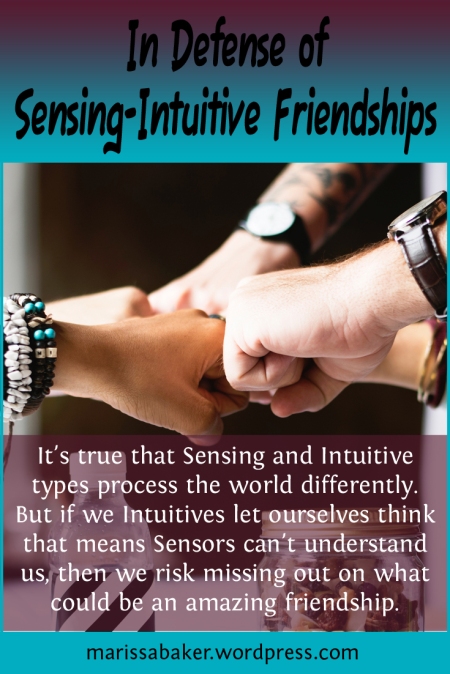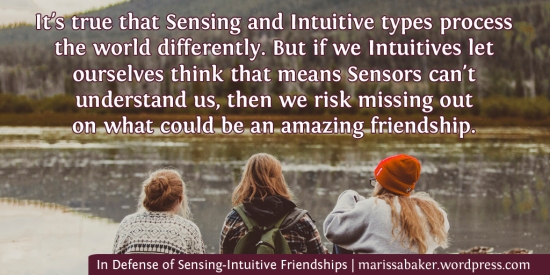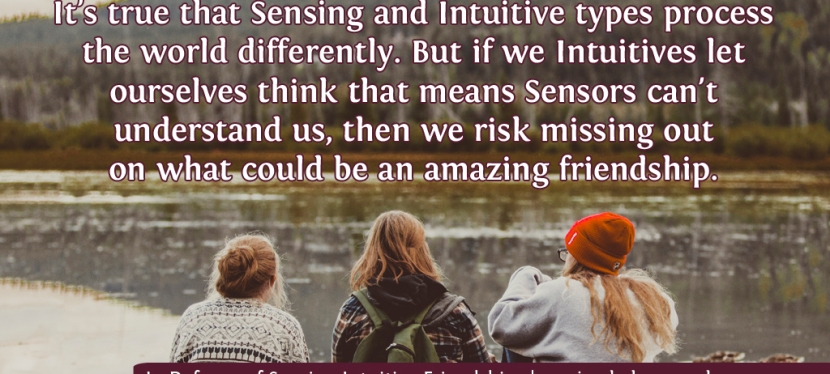I talk with quite a few people who have Intuitive type personalities and grew up feeling misunderstood. They knew they were different from other people but didn’t know why and that led to feelings of loneliness and isolation. In some cases this feeling came from a lack of people they could truly connect with. But others encountered outright rejection or bullying.
As we grew up and started learning about our personality types, the feeling of being different started to make sense. Intuitive types do see the world differently from most other people — we only make up 30% of the world’s population. The other 70% of people are Sensing types. And becasue the Intuitive/Sensing side of our personalities describes how we perceive things and learn new information, it plays a huge role in how we frame our conceptions of the world. It’s no wonder that Intuitives feel different from the majority of the people they meet.

The Amazing Intuitive Connection
There’s something incredible about learning you’re not alone. That there really are other people out there who process the world in much the same way you do. People whose eyes won’t glaze over when you dive deep into theoretical discussions, who won’t panic when you suggest a new perspective on traditional ideas, and who think talking about the future framed in all of human history is a great way to spend their afternoons.
I think Intuitives need other Intuitives around. I grew up with Intuitive siblings, eventually made several Intuitive friends, and now have the Intuitive Awakening group on Facebook. For close relationships, matching on your Intuition/Sensing preference is going to make it much easier to identify with and understand the other person. And I’m pretty sure any Intuitive with Intuitive friends or family is nodding their heads while reading this. We crave the opportunity to connect with other people who will understand us and validate our way of processing the world. It’s part of being human.
Inaccurate Sensing Stereotypes
But we can take our need for Intuitive connection to an unfortunate extreme and decide that other Intuitives are the only people worth talking with. People with this mindset say that Sensing types are too superficial, too selfish, too close-minded, and too judgemental for them to really connect with (a claim that is, when you think about it, an example of the mindset they’re accusing Sensors of having).
I know those stereotypes do Sensors a grave disservice, but I also suspect they’re coming out of a place of deep hurt. I suppose Intuitives who’ve given up on trying to connect with Sensors have had some terrible experiences of being misunderstood and rejected because of how their minds work. But even if you haven’t been hurt that badly, it’s still pretty easy to fall into the mindset that Sensing types just don’t understand us. How can they? Their minds are wired differently than ours.
Finding Intuition In Sensors
Many people who write about Myers-Briggs personality types describe Introvert-Extrovert, Sensing-Intuition, Feeling-Thinking, and Judging-Perceiving as dichotomies. They’ll say that you either fall on one side or the other of a sliding scale between the two opposites. But that’s not exactly correct.
Myers-Briggs personality types are based on a theory of mental functions that stack up in a certain order based on your natural preferences (click here for an introduction to function stacks). We each have a preference for Sensing or Intuition. That function is either our primary/driver process or our auxiliary/co-pilot process. If we lead with S/N, then our co-pilot will be F/T (and vice-versa).

But we don’t only have two functions we use. There are four that we have conscious access to and which help balance out our personalities. The third and fourth functions are mirror opposites of your two favorite functions, which means that all Intuitives have a Sensing function and all Sensors have an Intuitive function. So even if you’re an Intuitive, you do have a Sensing side. And all those Sensors that you think can’t understand you have an Intuitive side.
For ESTJ, ESFJ, ISTP, and ISFP types, Intuition is their tertiary/10-year-old process. That means they can learn to use it pretty comfortably, though it’s still not their favorite learning style. For ISTJ, ISFJ, ESTP, and ESFP types, Intuition is their inferior/3-year-old process. They’ll probably be more wary of intuition simply because it’s not all that reliable for them. But we can’t say Sensors don’t use Intuition or that Intuitives don’t have a Sensing side.
Sensing-Intuitive Relationships That Work
Myers-Brigges theory was never meant to divide people. Katherine Briggs and Isabel Myers wanted to give people a tool they could use to understand and appreciate themselves and others. Learning about personality types should empower you to develop good relationships with more people, not fewer.
I’m an INFJ and the woman who’s been one of my best friends for over 10 years is an ESFJ. My ENFP boyfriend is such good friends with an ISTJ that they’re like brothers. And the Intuitive-Sensor pairing doesn’t just work for friendships. Isabel Meyers, an INFP, wrote that it’s most important for couples in a romantic relationship to match on Sensing/Intuition. But she herself was happily married to an ISTJ.
It isn’t whether or not someone is a Sensor or an Intuitive that determines whether you can connect with them. It depends on how much you each respect and value the other person and how committed you are to working towards understanding. This has to go both ways, of course, but if you disregard the possibility of friendship simply because someone has an S in their types instead of an N then you’ll never know if they could be the person who’s willing to meet you halfway and really get to know you.

Thanks for writing this! I recently read a post somewhere about relationships and it seemed to be very negative about relationships with your mirror (or whatever you call the one with all the opposite letters). They considered it a minor, fleeting novelty affection, but I guess I think all affection is that way, and no matter the MBTI type there will be a learning curve in a relationship. The only way to get through it is with determination, respect and love in the active/verb sense of the word; of course the Bible already laid that out nicely for us.
I’ve seen a lot of examples of N/S relationships in my lofe. I’m married to the other kind if mirror (INTP/ENTJ), but my mom and dad are ENTP and ISFJ, which makes a wonderful pair. I actually get along better with my dad too, the ISFJ, and one of my best friends is an ISFP, which is my complete opposite. I don’t think the ISFP and I would have made it if I hadn’t known her type, but SFJs have been some of my favorite people to talk to in the past, as long as they are sufficiently nerdy. Another good friend of mine is an ISTJ and she is the only non-mom I know of with whom I can share my favorite children’s fantasy (a genre I like). One of my best friends is an ENFJ married to an ISTP, and I also know a couple about to have a fourth child who are ENFP/ISTP, even. I think it is difficult to communicate and respect each other’s needs, but they are both invested in being Christ-oriented and that has carried them through everything. The ENFJ/ISTP enjoy Biblical studies and fitness programs together. Lastly, my husband and I enjoy connecting on a sensing level almost as much as intuition. We were so excited when we moved into a house with a shop, so we can realize all of our home improvement dreams, so both sensing amd intuition are involved there.
Your post was almost like reading a refreshing rebuttal. Thanks!
LikeLiked by 1 person
It’s great that you have so many good relationships with Sensing types! I agree with you about the importance of active love. Even if you’re the exact same personality type as someone there will be ways you clash and it’s so important to choose to care about and work on understanding someone you’re in a relationship with. Glad you enjoyed the post 🙂
LikeLike